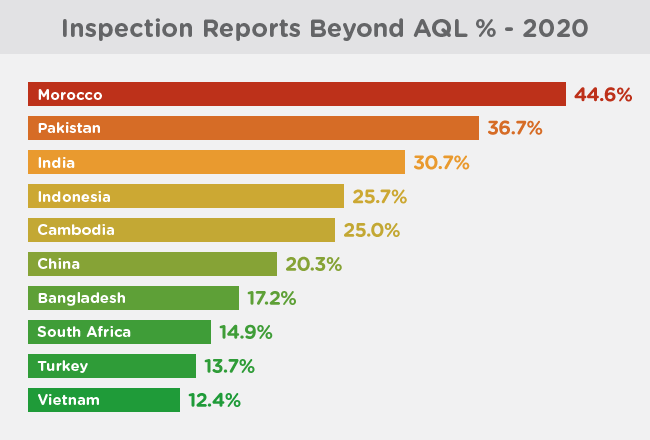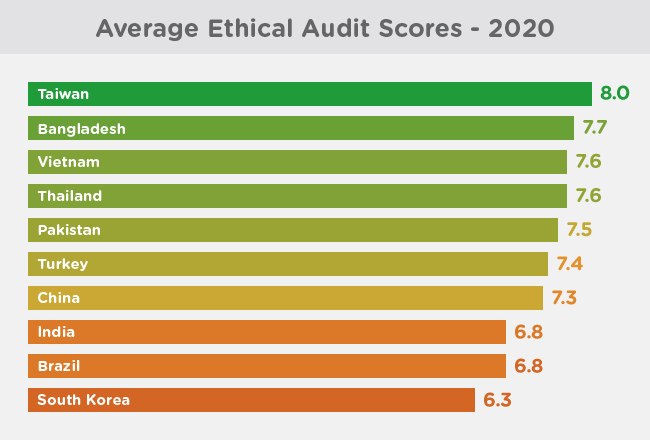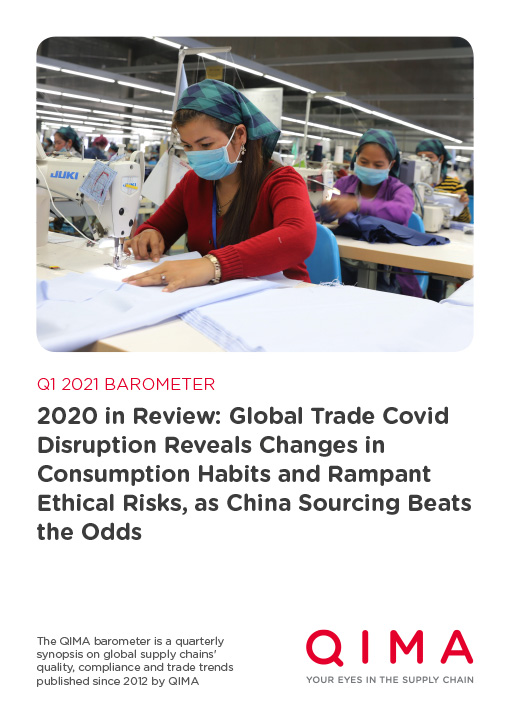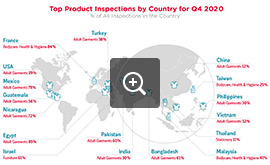QIMA 2021 Q1 Barometer
2020 in Review: Global Trade Covid Disruption Reveals Changes in Consumption Habits and Rampant Ethical Risks, as China Sourcing Beats the Odds
Almost a year into the COVID-19 crisis, uncertainty and disruption continue dominating global trade. In 2021, global sourcing is liable to remain at the mercy of the pandemic, emphasizing the importance of supply chain agility and efficiency to any business’s continued survival.
Looking back at a year of truly unprecedented disruption to global sourcing, QIMA’s 2020 data paints a picture of increasingly diversified supply chains, changing consumer habits and an alarming spike in ethical risks.
Demand-Side Shocks Consistently Prove More Disruptive to Global Sourcing Than Supplier-Side Lockdowns
QIMA data on inspection and audit demand in 2020 globally reflects the powerful impact of COVID-19 lockdowns and quarantines on global trade, clearly illustrating that demand-side shocks pose greater disruptive potential compared to lockdowns in supply-oriented regions. In H1 2020, many western brands and retailers successfully navigated the waves of lockdowns throughout Asia, compensating for manufacturing capacity shortages by pivoting their sourcing to regions that were still operating (resulting in global inspection and audit demand slumping only -4.5% YoY in January-February 2020). On the other hand, lockdowns in buyers’ home regions invariably caused sharp slumps in sourcing (demand for inspections and audits -31% YoY in April-May 2020) - a pattern that is repeating itself in late 2020, with lockdowns being reinstated in the EU and parts of the US.
China Sourcing in 2020: From Patient Zero to Recovery and Resilience
In the first half of 2020, it appeared that China, being the first country to suffer from COVID-19, would be the pandemic’s epicenter and the hardest-hit economy. However, after a disastrous Q1 marked by a manufacturing standstill and demand shock, China sourcing throughout the rest of 2020 followed a slow yet steady trajectory towards recovery. Towards the end of Q2, demand for inspections and audits in China returned to 2019 levels, and from there continued to grow throughout the second half of the year, only stalling in December as lockdowns were reinstated in multiple Western geographies. Ultimately, 2020 saw inspection and audit volumes in China contract -2.8% YoY compared to 2020 - which, despite the year of unprecedented disruption, represents a smaller drop in sourcing volumes compared to the -3.3% YoY drop observed in 2019 in the wake of US-China tariff war.
At least partially responsible for this relative resilience was the renewed interest of US buyers, who were in much less of a hurry to leave China in 2020, following the gradual easing of trade tensions in the wake of the ‘phase one’ trade deal signed in January 2020. Inspection and audit demand in China from North American brands remained above 2019 levels throughout the second half of 2020, with demand for inspections and audits slipping a total of -3.0% YoY in 2020 vs. 2019, compared to the stark -15% YoY drop from 2018 to 2019. By contrast, European buyers showed less demand for the traditional made-in-China FMCG - however, that decline was offset by the booming demand for PPE, which largely accounts for the inspection and audit demand ending 2020 flat YoY instead of a more dramatic decline.
Sourcing Diversification Accelerated by the Pandemic, With Asia’s Manufacturing Hubs in Demand
Even though China landed a better year than anticipated, the pandemic gave a powerful boost to the long-term trend of shifting buying volumes to its regional competition: demand for inspections and audits in Southeast Asia rose +19% YoY across the board in 2020 (twice the 2019 vs. 2018 YoY growth rate). As a whole, this region recorded double-digit expansion in inspection and audit demand starting from July, buoyed by buyers looking for alternatives to China both in the short and long term, as well as by massive orders for PPE.
Meanwhile, recovery was markedly slower in South Asia (+2.6% YoY growth in 2020 across the region, a fraction of the double-digit YoY growth recorded in 2019 vs. 2018), where manufacturers had a hard time coming back from the collapse in April and May, made catastrophic by the combination of regional lockdowns and demand decimated by lockdowns in the West.
Lockdowns and Work-from-Home Orders Trigger Shifts in Consumer Demand
Aggregated QIMA data for 2020 shows that the continuing waves of quarantine measures and unprecedented numbers of people working from home in the West have already been reflected in the changing consumer habits, in turn impacting global trade flows. Keeping up with fashion trends and updating wardrobes has clearly slipped down on the list of consumer priorities, with demand for Textile, Apparel and Footwear inspections ending 2020 at -11% YoY globally, having remained in a slump across the board since March, bar a brief rebound in September and October.
On the other hand, remote working and home schooling created a greater need for communication equipment and various home entertainment products. Inspection and audit demand for products such as Electronics and Electricals, Homewares and Toys among US based retailers has grown by leaps and bounds throughout H2 2020, with all of the above sectors ending the year with double-digit growth: +44% YoY, +28% YoY and +46.5% YoY, respectively.
COVID-19 Aggravates Ethical Risks in Supply Chains, With Labor Violations Skyrocketing
The intertwined challenges of the COVID-19 pandemic have strongly exacerbated human rights risks in global supply chains, with issues ranging from increased vulnerability to modern slavery and child labor (resulting from high poverty risks caused by mass job losses), to labor violations in factories and less scrutiny on non-virus related safety measures due to Health & Safety resources being stretched thin.
QIMA ethical audit data collected at reopened factories as well as in the course of remote audits paints an alarming picture, with the percentage of factories ranked "Red" for critical non-compliances increasing by more than 100% in H2 2020 compared to H1. Some of the most pressing issues are in the area of working hours and wage compliance: in China, 14% of factories audited were given a failing grade due to critical violations in the area of working hours and wages. Examples of violations include sanitation duties being imposed as unpaid overtime, as well as workers being pushed to work excessive hours to meet tight schedules for high-demand goods, such as PPE.
In response to the mounting ethical risks and limited physical access to factories, more businesses are accelerating the adoption of technological solutions for compliance and quality control, which include remote audits, worker voice solutions and integrated QC and compliance platforms that enable them to map their sourcing network and achieve better visibility into multiple supply chain tiers.
QIMA Barometer Key KPIs


Press Contact
Email: press@qima.com



